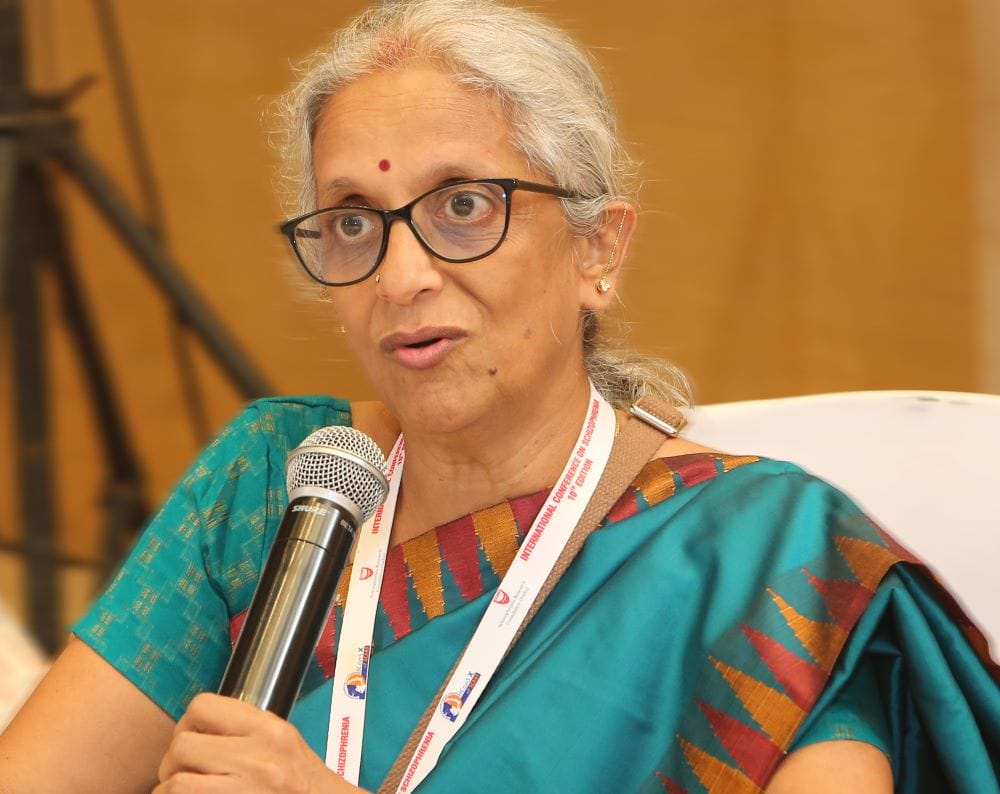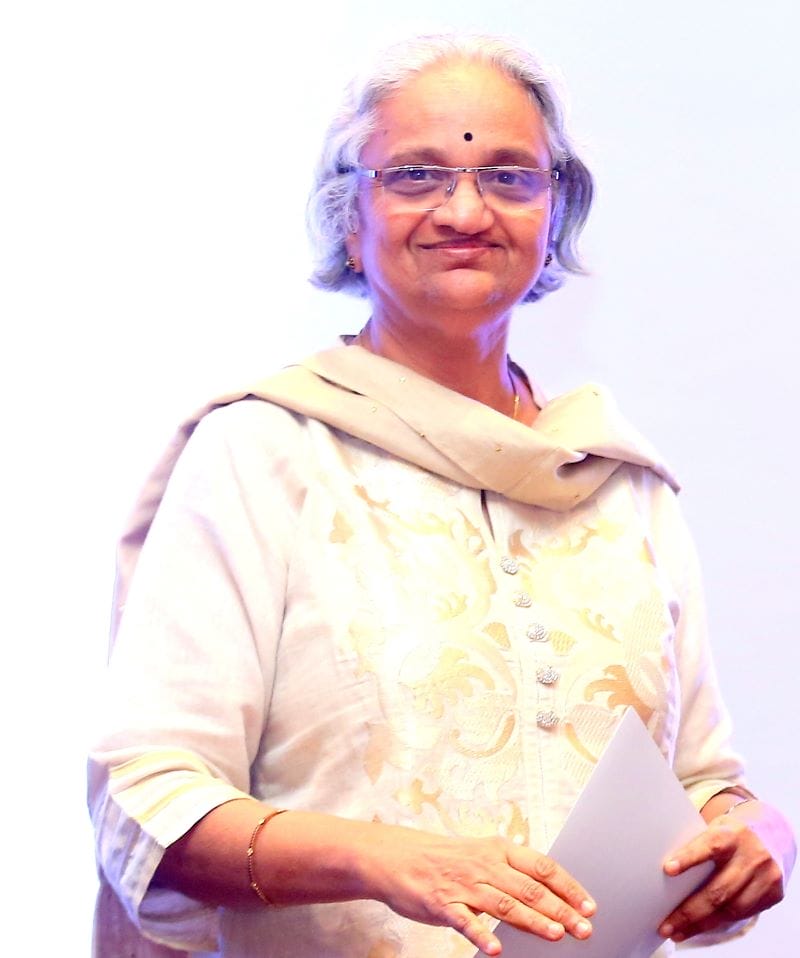A family of professional singers disguise themselves to take their loved one, a young girl with mental illness, for treatment in the psychiatric hospital. Such is the stigma of mental health disorders. While this was decades ago, the perception of such disorders has changed for the better, over the years.
As she narrates this incident, Dr R Padmavathi, Director of Schizophrenia Research Foundation (SCARF), a premium non-governmental organisation in mental health care in Chennai, says while healthcare delivery has made great strides, we still have a long way to go in awareness and overcoming stigma about mental disorders.
According to the National Mental Health Survey 2015-16, there is more than an 80 per cent treatment gap for all mental illnesses in India. This means that only 20 per cent have access to care. The numbers might be even lower considering in many marginalised communities and rural areas, people may not acknowledge mental health issues in their families.
Read more: Expenses, social stigma deter urban poor in Chennai from seeking mental health care
As SCARF celebrates 40 years of pioneering work and of rehabilitating thousands of patients, Citizen Matters has an in-depth conversation with Dr Thara Rangaswamy, Co-founder and Vice-Chairman of SCARF, and Dr Padmavathi about the challenges of mental health care delivery and how the scope of psychiatric illnesses has expanded over the years.
“Serious mental health disorders like schizophrenia, bipolar disorder and major depressive disorder do not get the attention they deserve and the problems of persons with serious mental health issues are often not addressed. Unlike other medical ailments, mental illness is mostly not visible and that is why it is more difficult to convince people to seek treatment,” says Dr Padmavathi.

Serious psychiatric disorders may begin as early as 15 to 20 years, and worsen with age without treatment. According to the World Health Organization (WHO), 50 per cent of all mental health disorders begin by the age of 14, with depression and anxiety being high among adolescents.
Mainstreaming a challenge
Bringing people with mental illness who are cured, into the mainstream is a challenge that mental healthcare organisations face all the time. Employers are often hesitant to give them work but attitudes are slowly changing.
The contribution of SCARF in raising awareness about this issue has been immense. When it was established in 1984, the focus of this NGO was on rehabilitation, public awareness and research related to mental health. Over the years, it has expanded its scope to include treatment for emotional disorders, dementia care, youth mental health programmes, community health care, mobile telepsychiatry and much more. SCARF also started vocational training to help patients secure jobs.
“When Dr Sarada Menon, one of the leading psychiatrists in the country at that time, retired as Director of the Institute of Mental Health in Chennai, she was concerned about the lack of rehabilitative services for people with mental illnesses. So, along with Dr Thara, who was involved in schizophrenia research then and Dr Rajkumar, a leading psychiatrist, Dr Sarada started SCARF. One thing they all felt strongly about – was that rehabilitation services should be provided at no cost to the patients or their families. And that has continued ever since,” adds Dr Padmavathi.
Perceptions about mental illness
“When we started 40 years ago, most people did not think that mental health was important. There was this notion that the mentally ill never get cured; it is like a life-long banishment, so why invest in such a person? People were reluctant to use the word schizophrenia but we stuck to it. We felt that only if we use the word, people will understand what it means,” says Dr Thara.
Read more: Schools and families both critical in mental health support for kids and teens
Since there is much written about in publications and movies made about mental illness in recent times, awareness has increased. Yet, even in a big city like Chennai misinformation and superstitious beliefs abound. Both Dr Thara and Dr Padmavathi feel that people want to believe in evil spirits and superstitions so that they can give explanations for mental health issues beyond their understanding.
“These beliefs are prevalent even among the educated urban population. Maybe not to the extent you see in rural areas but it is there. In rural areas, it’s generally seen as a behavioural disorder and not as a disorder of the brain that can be addressed with treatment,” adds Dr Thara.
In the last few years, COVID-19 changed perceptions and opened people’s eyes to mental health issues and the need to access care, she says.
Phone-in services have also changed the way patients access counselling and treatment. “We have both children and adults who call us when they are distressed. Our studies show that tele-counselling for emotional problems has had good health outcomes,” adds Dr Padmavathi.
What are the common mental ailments seen in a city like Chennai? “Largely, we see a lot of depression, anxiety and stress-related disorders. Alcoholism and drug-related issues are also prevalent. People are also presenting with major psychosis such as schizophrenia, bipolar disorder and so on,” says Dr Thara.
Warning signs of mental illness:
According to the American Psychiatric Association here are some signs to look out for:
- Sudden or rapid changes in mood; feeling depressed or irritable
- Having difficulty sleeping and carrying out day-to-day activities
- Feelings of extreme sadness and hopelessness; disinterest in and withdrawal from social activities
- Problems of memory, concentration; unable to think logically
- Loss of appetite and lack of personal care
- Poor coping mechanisms; worsening performance at school or work
- Thoughts of self-harm; feeling isolated
Community health programmes and mobile psychiatry
The National Mental Health Programme (NMHP) was introduced in 1982 and SCARF was one of the first non-government organisations in the country to actively participate in the programme. “Our outreach clinics made psychiatric services available to people in remote corners of Tamil Nadu. We trained community-level workers to identify persons with mental illness. These community workers would travel far and wide to give medicines. Now the programme focusses on rehabilitation services,” says Dr Padmavathi.
Through these outreach programmes, many people with undiagnosed psychosis for more than 10 years, were able to access treatment for the first time.
Apart from community health programmes, SCARF has also pioneered mobile psychiatry in seven districts in Tamil Nadu. A custom-built bus travels to rural areas, with necessary communication equipment for consultation with the psychiatrist at the Chennai facility.
In India, the NMHP was quickly followed by the Mental Health Act of 1987, which focussed mostly on admission and care of individuals with severe illness. While it took decades for the Mental Healthcare Act, 2017 to be enacted, it is a more robust legislation that focusses on the rights of the patient and decriminalises suicide attempts. But when it comes to implementation, we haven’t even scratched the surface. “We have a long way to go in implementation. For example, the law provides for insurance for the mentally ill, but its not available to them,” says Dr Padmavathi.
Theatre, films and art as therapy
Integrating art and theatre in the healing process can help patients and their caregivers understand mental health issues and the process of rehabilitation. This has been tried by healthcare organisations all over the world with some success. SCARF has initiated the ‘waiting room’ drama, where the staff including doctors and nurses, puts up a play in the area, where people are waiting for consultations. The stories that are enacted are elicited from the patients and caregivers. This fosters a better understanding of problems faced by persons with mental illness, showing them a path towards recovery.
If you or someone you know is feeling anxious, distressed or thinking of self-harm, reach out to the following helplines in Chennai for assistance:
- SNEHA 044 – 24640050
- Institute of Mental Health Chennai – 044-26425585
- iCall – 9152987821
- SCARF – 9150455736/
Also read:
- Interview: How can Chennai bring its steeply rising suicide curve down?
- Want students to thrive? Give better facilities to school counsellors
